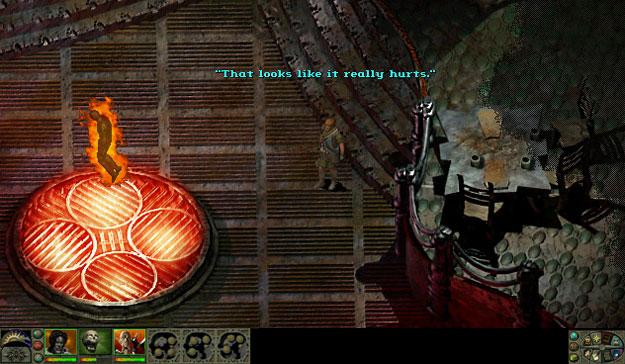
We’ve tried hard not to get too excited about the resurrection of Black Isle Studios. And it’s looking like our lack of excitement was justified, as The Verge has reported that the re-opened Black Isle shows every indication of being nothing more than a logo that Interplay can smack on top of other people’s games.
Anyone who’s been playing games since the 90’s still gets a thrill up their leg at the sight of the Black Isle logo, which once preceded masterpieces like dense fantasy universe Baldur’s Gate, isometric despair generator Fallout 2, and Planescape: Torment, which many still consider the best-written RPG of all time. Interplay cruelly stoked our long-dead flames of excitement with a Facebook page identifying the new Black Isle as ” is a division of Interplay formed to develop and publish high quality role-playing games.” Even the most cynical of industry watchers began to dream of a new MDK or even—dare we hope?—a modernized Planescape.
But it’s looking like those hopes are as doomed as an under-equipped explorer of the Wasteland. The Verge searched through LinkedIn, and discovered that thus far, no developers are listing themselves as employed at Black Isle. Even grimmer, Black Isle’s careers page offers no jobs at all, and none of the original Black Isle crew has been approached to work at the new company. Based on the available evidence, there’s little reason to believe it’s staffing up to create the next big thing; it doesn’t seem to have the personnel to develop so much as an iPhone game.
Worse still, The Verge notes that most of the great Black Isle games were based on properties whose rights have reverted back to their original owners. Any attempt to resurrect that Planescape series, for example, would require re-purchasing the rights from Wizards of the Coast; and unlike fifteen years ago, WotC has a vigorous video game division of its own. There’s little reason for it to rent out a beloved property, no matter how much gamers kick and scream and hold their breath until their collective face turns blue.
A clue to Interplay’s true intentions is in the original press release announcing Black Isle’s return. Though the press release talks about “getting the band back together”, it opens by announcing that “Black Isle Studios returns to game publishing.” That’s publishing, not developing.
The distinction between developer and publisher is one that a lot of civilians are unclear on, but for those inside the industry, it’s the difference between a filmmaker and a studio executive, with inherent hostile relations. A developer makes games: writes the story, creates the art, programs the engine, and does all the things to make it wonderful. A publisher is a pure business entity; it fronts money, handles disc and box manufacture, and markets the game. At its most creative, a publisher makes occasional demands of the developer, which often does more harm than good; many a developer has been sunk by publishers who swoop in with absurd multiplayer requirements, unrealistic schedules, and harsh budget cuts.
These days, many are questioning whether the industry needs publishers at all. With digital distribution eliminating the need for manufacturing, social media becoming a major marketing tool, and community forums acting as a better guide to what players want than some executive’s demands, the role of the publisher is steadily eroding. The only thing a publisher can offer a self-reliant developer is the prestige of its name, and that’s where Black Isle still has something to offer. A lot of gamers will see the Black Isle logo and buy whatever’s being sold, in the hopes of a return to the studio’s glory days. So it may be that the label resurrection still has some value to Interplay. But it will only take one lousy game to destroy gamers’ loyalty and trust — and at this point, that’s the only asset Black Isle has.


